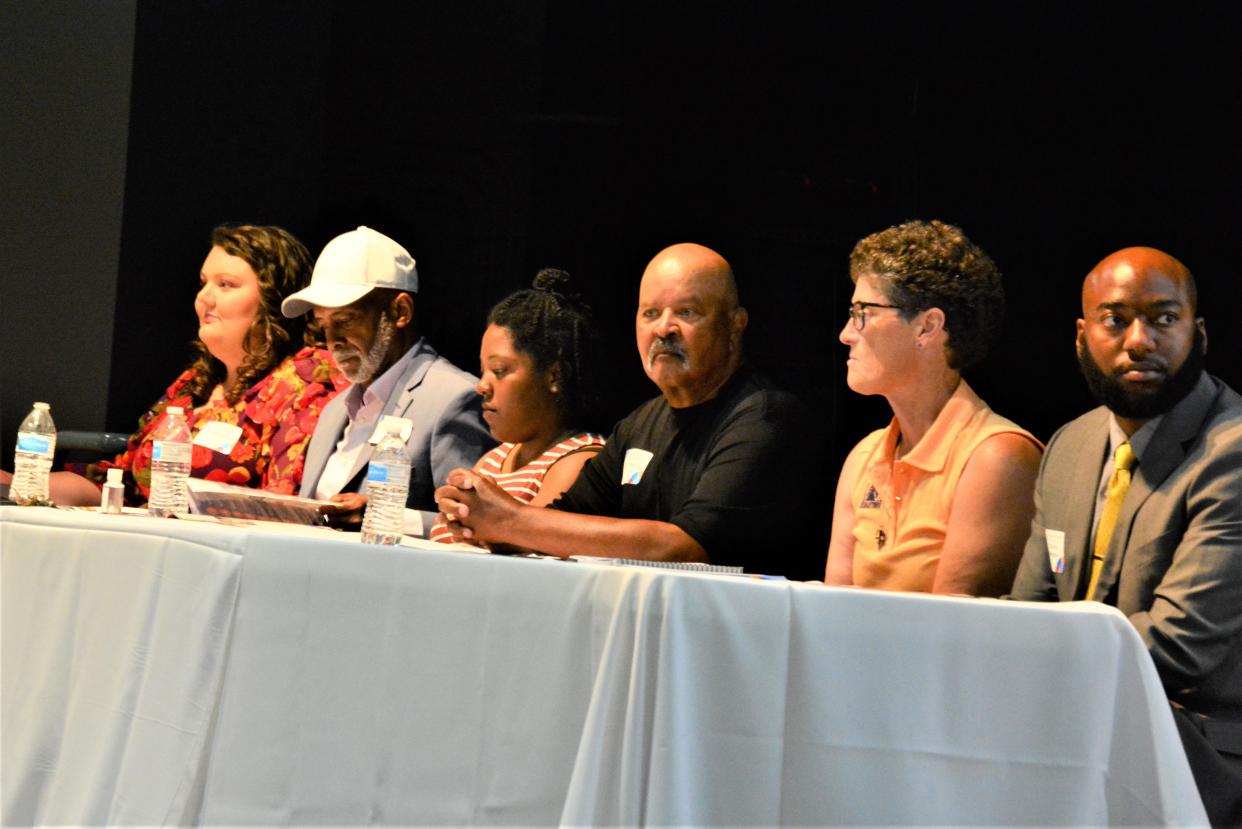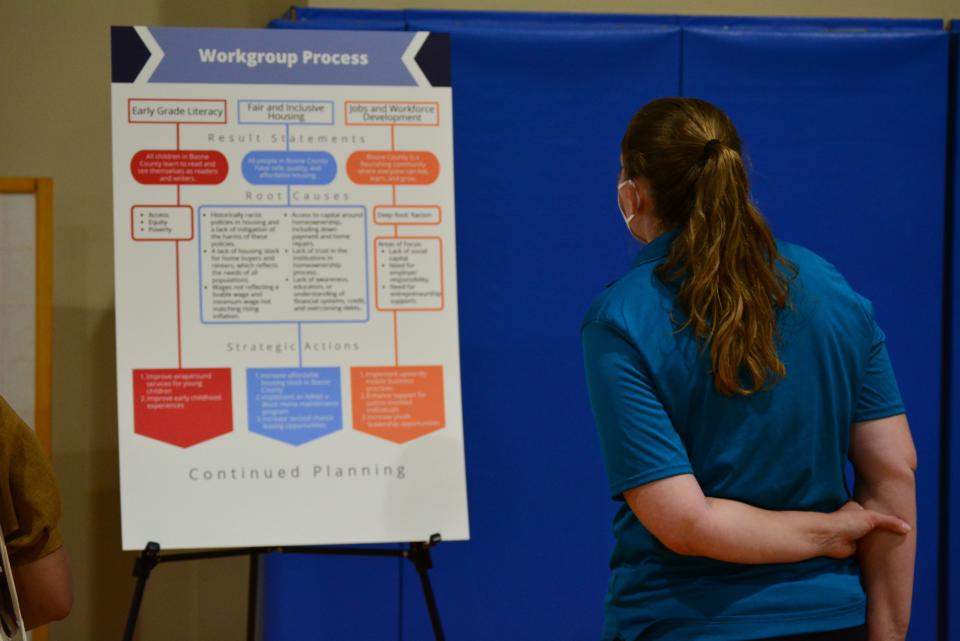'Different approach to planning' used to create Mobility Action Plan to address Boone County poverty

Roughly 13 months ago, Boone County leadership applied and joined the Urban Institute's Upward Mobility Cohort of eight counties nationwide.
The county now is ready to implement its Mobility Action Plan.
The results of the work in addressing community poverty to bring in systems of upward mobility for low-income individuals and families were presented Tuesday at Missouri United Methodist Church.
When the county was making its application for the cohort, Darin Preis, Central Missouri Community Action executive director, made a blunt statement about why the county needed a mobility action plan, said Janet Thompson, Boone County commissioner.
"He said, 'We have done a miserable job in ensuring everyone in our community has access to the same resources, has equal access to upward mobility,'" Thompson said. "Thank you, Darin, for being that voice of truth. Speaking truth to power is often uncomfortable, but I think that voice of truth was a big part of why we were chosen to be part of this cohort."
More: Boone County raised to medium community risk level for COVID-19 cases
Workgroups were formed with facilitators of those groups also being stakeholders in the process. These stakeholders included Al Plummer, Brittany Hughes and Al Cobbins.
Plummer and Cobbins are with the Minority Men's Network and their workgroups focused on early grade literacy and job and workforce development, respectively. Hughes, of Missouri Faith Voices, headed up the workgroup on fair and inclusive housing.
It is these three areas where there are the most common hindrances to upward mobility or the "idea that everyone deserves the chance to improve their lives, to strengthen their economic well-being, to be valued and feel they belong and to have power and autonomy," a provided action plan report stated.
How the county formed its Mobility Action Plan
Boone County Community Services, along with the workgroups, took countywide data in which to answer questions about disparity and policies affecting low-income and/or Black, Indigenous or people of color populations.
Explorations of supportive communities, strong and healthy families and opportunities to earn and learn were part of that.
"Boone County used metrics to initially understand local conditions and disparities, set priorities and influence policy action to reduce inequities," said De'Andre Thompson, program diversity, equity and inclusion specialist for Boone County Community Services.
Crime rates, infant mortality, employment and poverty all were analyzed, among others.
This, in turn, led to the workgroups using a results-based accountability framework to ask five questions through "turn the curve" thinking. In other words, finding ways to improve community outcomes that currently are seeing deepening divides.
Answering the questions led the workgroups to make results statements, which helped identify root causes of upward mobility barriers, leading to crafting plans for strategic action.
Conclusions from the workgroups
Early grade literacy
The workgroup wants all children in Boone County to see themselves as readers and writers, Plummer said. This happens through wraparound services for children and improvements to early childhood experiences.
This includes things like targeted tutoring, child care access, transportation, targeted home visit services and afterschool program access, among others.
"Arriving at our conclusion was an extremely difficult task," Plummer said. "Now, the hard work begins. Implementing the action plan."
Plummer is familiar with how limited access to reading and literacy can affect a person in their adult life. He attended five different elementary schools before middle school. Each of these schools had varying resource access.
"They were at the economic extreme of things. One was very well-to-do and one with kids like me, who didn't have a lot," Plummer said. "That affected my reading and learning process."

Fair and inclusive housing
The purpose of the workgroups was "to look at the box people feel they are confined into and figure out what is possible, and what is imaginative outside of those confines," Hughes said.
A major factor in housing access for poor and/or Black families comes down to historically racist policies. That is part of the roots of housing access, including lack of affordable housing stock, nonliving wages and lack of trust in the homeownership process.
The workgroup found that mortgage costs for Black homeowners roughly was 20% higher than their white counterparts.
"We ultimately wanted to make sure Boone County was a place folks felt they had safe and affordable long-term housing," Hughes said about the workgroup's action plan.
One solution is the formation of an adopt-a-block program, in which more affluent neighborhoods partner with poorer neighborhoods to assist in home maintenance and upkeep.
"There is not a need to reinvent the wheel. We need to get people in a room and figure out how to consolidate that work," Hughes said, noting this can include training for landlords and tenants about rights, but also healthy relationships between those two groups.
The collaboration and variety of people who attended workgroup meetings were refreshing, Hughes said.
Job and workforce development
The job and workforce development workgroup was able to create a "bird's-eye view of the actual population in Boone County and Columbia," Cobbins said.
This workgroup has not yet finished its conclusions and was given leave to complete its work through the end of the summer, he added.
However, when the group found its result statement of "Boone County is a flourishing community where everyone can live, learn and grow" within 90 minutes of its first meeting, Cobbins knew this group was dedicated and motivated to do the work.
"We discovered simply it takes the whole community. The haves and the have-nots for this to work," he said.
The strategic actions the workgroup identified were the implementation of upward mobility business practices, enhancing support of justice-involved individuals and increasing youth leadership opportunities.
"Once we identified a root cause (of the barriers), then we now move into how do we create and put systems in place to deal with it," Cobbins said. "We want to go through the full process."
The next steps
All the workgroups had common themes when they were conducting their work, which started in November, said Megan Bania, data and performance analyst for Boone County Community Services and project leader for the county's Mobility Action Plan.
Themes included addressing systemic racism and structural inequality across the community and in its systems.
"It was clear historic federal, state and local policies are still impacting generational wealth and limit upward mobility from poverty," Bania said.
Coordination and targeted planning is needed to address these, along with improved data collection, she added.
"Addressing these common needs will allow each of the workgroups to further flourish as implementation begins," Bania said.
More: What's with the recurring power flickers? Columbia Water and Light sheds light on downtown outages
Boone County Community Services plans to release annual progress updates, along with data metrics, on the Boone Indicators Dashboard. The county also has received funding to provide results-based accountability training to local groups, which elicited a person in the audience Tuesday to say, "Yes!"
"This training will allow us to all speak the same language and follow similar approaches in working to improve upward mobility in the future. We hope to announce other increases in capacity soon," Bania said.
Charles Stephenson with Powerhouse Community Development Corp. said he now is excited to sign up for a workgroup to help them implement their action plans, noting that the data presented Tuesday tells a story about the community. He was part of Tuesday's audience.
"It leaves a footprint of direction. You have to have that data to make an impact, to make a difference," he said. "I loved the collaboration. It seems like they have truly categorized some core areas.
"People are in survival mode. That is kind of what we are seeing in our community. I definitely love what they are doing."
Charles Dunlap covers courts, public safety and other general subjects for the Tribune. You can reach him at cdunlap@columbiatribune.com or @CD_CDT on Twitter. Please consider subscribing to support vital local journalism.
This article originally appeared on Columbia Daily Tribune: Boone County leaders announce implementation of poverty action plan

